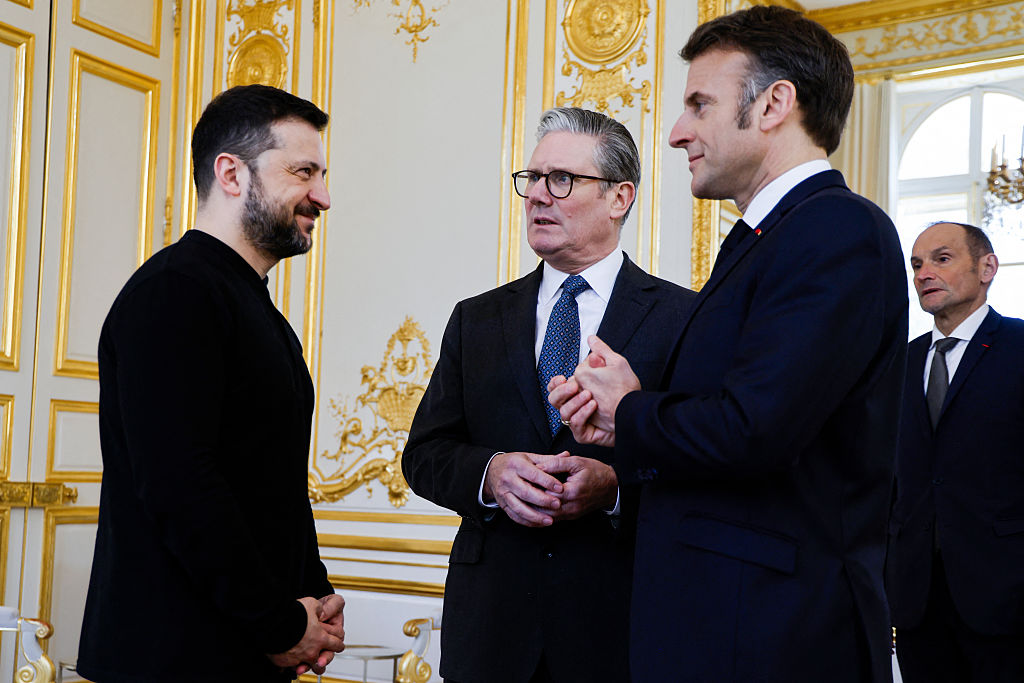When it comes to Europe’s security, each step toward independence is usually followed by at least two steps back. This unfortunate trend continued in Paris yesterday following hours of debate between dozens of European leaders about their role in Ukraine’s future.
The group’s tentative acknowledgement that Ukraine’s own military force would be the cornerstone of the country’s defence over the long term was an important departure from previous assertions that binding security guarantees are Kyiv’s only path to lasting peace. But European leaders negated this rhetorical progress by continuing to haggle over their illusory “reassurance force”, which they seem to think would deploy to Ukraine after the war’s end. Rather than wasting more time on this costly distraction, Europe should spend its energy figuring out how to get Ukraine what it will need to build a military capable of defending its borders without assistance.
It’s been about six weeks since US President Donald Trump and his national security team bluntly informed European allies that the responsibility for Ukraine’s future security would be theirs. Despite several emergency meetings, the continent has yet to come up with a plan.
French President Emmanuel Macron and British Prime Minister Keir Starmer’s preferred solution — some sort of European peacekeeping force — is unlikely to materialise despite yet another day of negotiation. For starters, few countries in Europe are willing to participate. Macron has promised a “coalition of the willing” but, for now, that coalition has just two public members: France and the United Kingdom. Even Starmer’s support is conditional, and he’s holding out for a US backstop that is not forthcoming.
What’s more, it remains unclear what European soldiers would do in Ukraine. Europe lacks the military capacity to credibly act as a deterrent force without US backing, and it cannot claim to be a neutral ceasefire monitor as it has already taken sides. Regardless of its purpose, Moscow has said it will not accept a settlement that leaves foreign forces inside Ukraine.
Europe must jettison its misguided pursuit of a reassurance force and instead concentrate on what is a much more likely and feasible outcome for Ukraine: armed neutrality. Armed neutrality would not give Ukraine external security guarantees or station foreign forces inside its territory. But it also would not leave it defenceless. On the contrary, it would ensure that Ukraine is well-armed and capable of deterring future Russian aggression on its own.
After their meetings in Paris, some European leaders seemed to lean toward this option, admitting that Ukraine’s enduring security would rest largely in the hands of its own armed forces. Volodymyr Zelensky himself even seemed amenable, noting that “it’s obvious that the strength and size of the Ukrainian army will always be a key guarantee of our security.”
Left unspecified, however, is how a future Ukrainian military will be equipped and sustained to serve, in effect, as its own security guarantee. Much of this responsibility will fall to Europe.
Ukraine’s military requirements will be extensive. The country will need thousands of air-defence missiles, land and anti-tank mines, artillery systems and munitions, anti-ship missiles to protect its coast, armoured vehicles, and tens of thousands of small drones. Construction equipment and concrete can help build barriers, dragon’s teeth, and trenches to make Ukraine’s borders impenentrable. Soldiers will require basic gear and protective equipment. Over the medium term, Ukraine may need up to $20 billion in military assistance annually.
Europe’s defence industrial base is currently unable to meet these demands on a reasonable timeline, especially while also trying to reduce its dependence on Washington. Addressing this insufficiency — rather than devising a plan for boots on the ground in Ukraine — should be Europe’s number-one priority. The continent has many advantages here, including extensive economic capacity and advanced technological capabilities, if it chooses to activate them.
European leaders will need to quickly find strategies and funding vehicles, at the national and supranational level, that can expand production, as well as alternative suppliers such as South Korea to fill their own and Ukraine’s needs.
A continued fixation on a “reassurance force” will not win respect from the US. Instead, Europe’s ticket to relevance will be its success in mobilising its considerable economic and technological strengths into real hard power.











Join the discussion
Join like minded readers that support our journalism by becoming a paid subscriber
To join the discussion in the comments, become a paid subscriber.
Join like minded readers that support our journalism, read unlimited articles and enjoy other subscriber-only benefits.
Subscribe